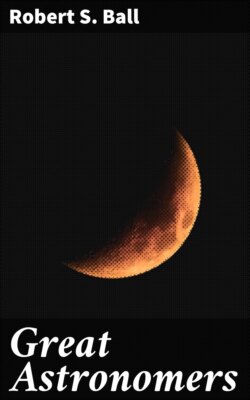Great Astronomers

Реклама. ООО «ЛитРес», ИНН: 7719571260.
Оглавление
Robert S. Ball. Great Astronomers
Great Astronomers
Table of Contents
PREFACE
INTRODUCTION
PTOLEMY
COPERNICUS
TYCHO BRAHE
GALILEO
KEPLER
ISAAC NEWTON
FLAMSTEED
HALLEY
BRADLEY
WILLIAM HERSCHEL
LAPLACE
BRINKLEY
JOHN HERSCHEL
THE EARL OF ROSSE
AIRY
HAMILTON
LE VERRIER
ADAMS
Отрывок из книги
Robert S. Ball
Published by Good Press, 2019
.....
Ptolemy was an excellent geometer. He knew that the rising and the setting of the sun, the moon, and the myriad stars, could have been accounted for in a different way. If the earth turned round uniformly once a day while poised at the centre of the sphere of the heavens, all the phenomena of rising and setting could be completely explained. This is, indeed, obvious after a moment's reflection. Consider yourself to be standing on the earth at the centre of the heavens. There are stars over your head, and half the contents of the heavens are visible, while the other half are below your horizon. As the earth turns round, the stars over your head will change, and unless it should happen that you have taken up your position at either of the poles, new stars will pass into your view, and others will disappear, for at no time can you have more than half of the whole sphere visible. The observer on the earth would, therefore, say that some stars were rising, and that some stars were setting. We have, therefore, two totally distinct methods, each of which would completely explain all the observed facts of the diurnal movement. One of these suppositions requires that the celestial sphere, bearing with it the stars and other celestial bodies, turns uniformly around an invisible axis, while the earth remains stationary at the centre. The other supposition would be, that it is the stupendous celestial sphere which remains stationary, while the earth at the centre rotates about the same axis as the celestial sphere did before, but in an opposite direction, and with a uniform velocity which would enable it to complete one turn in twenty-four hours. Ptolemy was mathematician enough to know that either of these suppositions would suffice for the explanation of the observed facts. Indeed, the phenomena of the movements of the stars, so far as he could observe them, could not be called upon to pronounce which of these views was true, and which was false.
Ptolemy had, therefore, to resort for guidance to indirect lines of reasoning. One of these suppositions must be true, and yet it appeared that the adoption of either was accompanied by a great difficulty. It is one of his chief merits to have demonstrated that the celestial sphere was so stupendous that the earth itself was absolutely insignificant in comparison therewith. If, then, this stupendous sphere rotated once in twenty-four hours, the speed with which the movement of some of the stars must be executed would be so portentous as to seem well-nigh impossible. It would, therefore, seem much simpler on this ground to adopt the other alternative, and to suppose the diurnal movements were due to the rotation of the earth. Here Ptolemy saw, or at all events fancied he saw, objections of the weightiest description. The evidence of the senses appeared directly to controvert the supposition that this earth is anything but stationary. Ptolemy might, perhaps, have dismissed this objection on the ground that the testimony of the senses on such a matter should be entirely subordinated to the interpretation which our intelligence would place upon the facts to which the senses deposed. Another objection, however, appeared to him to possess the gravest moment. It was argued that if the earth were rotating, there is nothing to make the air participate in this motion, mankind would therefore be swept from the earth by the furious blasts which would arise from the movement of the earth through an atmosphere at rest. Even if we could imagine that the air were carried round with the earth, the same would not apply, so thought Ptolemy, to any object suspended in the air. So long as a bird was perched on a tree, he might very well be carried onward by the moving earth, but the moment he took wing, the ground would slip from under him at a frightful pace, so that when he dropped down again he would find himself at a distance perhaps ten times as great as that which a carrier-pigeon or a swallow could have traversed in the same time. Some vague delusion of this description seems even still to crop up occasionally. I remember hearing of a proposition for balloon travelling of a very remarkable kind. The voyager who wanted to reach any other place in the same latitude was simply to ascend in a balloon, and wait there till the rotation of the earth conveyed the locality which happened to be his destination directly beneath him, whereupon he was to let out the gas and drop down! Ptolemy knew quite enough natural philosophy to be aware that such a proposal for locomotion would be an utter absurdity; he knew that there was no such relative shift between the air and the earth as this motion would imply. It appeared to him to be necessary that the air should lag behind, if the earth had been animated by a movement of rotation. In this he was, as we know, entirely wrong. There were, however, in his days no accurate notions on the subject of the laws of motion.
.....